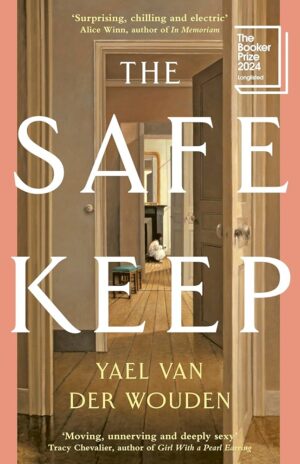Marvellously, an unparalleled five of the six titles shortlisted for this year’s Booker Prize are by female writers. One of them is also a debut novel, a remarkable achievement for The Safekeep by Yael van der Wouden. Set in a sleepy Dutch province in the early 1960’s, this meticulously plotted story introduces us to Isabel, an uptight young woman leading a lonely existence as the sole inhabitant of her childhood home. Her life is set to be irrevocably altered one sultry summer, when an uninvited guest moves in, disrupting Isabel’s quiet days of ‘small moments,’ and forcing her to confront some uncomfortable truths.
Isabel and her brothers, Louis and Hendrik, are of the generation of young adults whose parents had difficult decisions to make during the war (or had them made for them). In their case, their widowed mother had despatched them from battle-scarred Amsterdam to the bucolic Overijssel in the eastern Netherlands. Here, the family had rebuilt their lives in a home beloved by Mother for its recurring hare motif; hare figurines and crockery, patterned hares on the hearth tiles.
This leporine pattern will come to assume great significance in Isabel’s life, but in the beginning it is merely the familiar backdrop of her days. Mother is dead, her brothers prospering out in the world, while Isabel has nothing but this house, ‘nothing but these clean floors and neatly made beds.’
Even this feels somewhat precarious. As Louis is the eldest son, he has been bequeathed the house. Isabel is only its custodian, until Louis decides to marry and raise a family of his own. Thankfully for Isabel, Louis is a womanising commitment-phobe and his dalliances rarely intrude upon her consciousness. Until the day he asks her to play hostess to his new lover, Eva, and a powerless Isabel is forced to watch as an interloper moves into her mother’s old bedroom, unlocking buried secrets, and changing the very fabric of her family history.
Van der Wouden’s mesmeric novel unfolds around the unsettling presence of temporary houseguest, Eva, who to Isabel’s eyes, appears a touch vulgar with her too-tight dress and painted eyebrows. Eva conveys a loud restlessness and spontaneity that both repels and compels Isabel.
Household items begin to go missing, a spoon, a silver candlestick; Isabel knows she should suspect the maid. At night, she hears Eva sobbing in her sleep. And then, something else. The brush of Eva’s hand, the dip of her waist.
Shot through with an erotic charge, Isabel and Eva’s story is very much one of time and place. At the age of almost thirty, Isabel is on a path to enlightenment, both in terms of her own sexuality and personal history. Van der Wouden tells us that she was fifteen ‘when she first heard about the camps,’ her early years memories shifting and often conflicted.
In fact, it’s Eva’s diary, revealed in the third part of the novel, that begins to tie the loose threads of this sensational story together; a compelling exploration of a lesser known episode of Dutch wartime history, the constrictions once placed on women’s lives, and a glorious sexual awakening.
An excellent shortlist choice.
The Safekeep by Yael van der Wouden is published by Viking, 272 pages.





